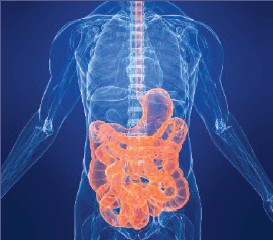Gas, Constipation and other Irregularities

Gastrointestinal (GI) discomfort, such as gas, constipation or loose stools, are issues everyone experiences at some point. However, if these issues are frequent or persistent, they should not be ignored. For some people, this may be easier said than done. Generally, talking about GI issues and discussing your bowel habits with your physician is outside of our societal norms and comfort zone. As with any health issue, the more details you share (especially family history) the better. How you interpret symptoms and how your physician interprets them may vary dramatically, thus having an impact on an appropriate diagnosis.
Many factors can cause GI-related discomfort such as gas, constipation, diarrhea and cramps. Sometimes, we can have extreme discomfort simply because we ate a food that did not agree with us. However, when these symptoms are experienced with some regularity, the culprit may be a diet low in fiber, stress level, medication (including iron pills and narcotics), lack of exercise, travel or other changes in our routine.
Interestingly, there is a direct connection between your brain and your stomach, and when you’re feeling stressed, your stomach reacts. Stress can present in many ways, from “butterflies in the stomach,” to nausea, diarrhea or constipation. Despite a vacation’s promise of relaxation and stress reduction, many people encounter intestinal discomfort when traveling. This can be the body’s normal reaction to a change in diet and daily routine (including regular visits to the bathroom). Furthermore, the air on board planes is extremely dry, which can lead to dehydration, and, in turn, constipation. It is important to keep well hydrated when traveling.
Persistent diarrhea, abdominal pain and rectal bleeding are warning signs not to be ignored. Early medical intervention is essential to help diagnose—or rule out—a serious disease or condition. Following are examples of symptoms. It is important to note that the symptoms of these minor to very serious diseases can be similar, underscoring the importance of making an appointment with your physician.
Irritable Bowel Syndrome (IBS): This disorder is characterized most commonly by cramping, abdominal pain, bloating, constipation and diarrhea. Although IBS can cause great discomfort, the intestines are not permanently harmed and it is not likely to lead to a more serious disease. According to the National Institutes of Health it is thought that people suffering from IBS have colons that are more sensitive and reactive to specific foods and stress.
Inflammatory Bowel Disease (IBD): Crohn’s disease and ulcerative colitis are collectively known as inflammatory bowel disease with the following distinctions:
- Crohn’s disease This chronic disorder causes inflammation of the digestive tract, most commonly affecting the small intestine and/or colon.
- Ulcerative colitis Similar to Crohn’s disease, ulcerative colitis affects the large intestine, marked by inflammation and ulceration of the colon’s innermost lining.
Symptoms of the two diseases are similar, including continual diarrhea, cramp-like abdominal pain, fever and sometimes, rectal bleeding.
Celiac Disease: This autoimmune disease causes damage to the lining of the small intestine and prevents food absorption, depriving the body of nutrients. Damage results from a reaction to gluten, which is found in all forms of wheat and related grains like rye and barley. Symptoms may include abdominal cramping, intestinal gas, bloated stomach, chronic diarrhea or constipation, and anemia.
Colon Cancer: This type of cancer occurs when cancer cells form in the tissues of the colon. Symptoms can include a change in bowel habits, blood in the stool, diarrhea, frequent gas pains, bloating and cramps.
Gastric Cancer: When cancer cells form in the lining of the stomach, it is called gastric cancer. The disease forms in the innermost lining of the stomach and spreads outward. Early stage symptoms of gastric cancer may include indigestion, mild nausea, heartburn and loss of appetite.
As is well known, early diagnosis for colorectal cancers is critical for a cure. Screening tests such as a colonoscopy have become a mandatory recommendation in preventive healthcare planning.
Finally, taking a cue from our professional peer Dr. Mehmet Oz and what he calls the “no embarrassment zone,” it is a good idea to monitor your own bowel movements. Shape, consistency, color and odor can be a blunt assessment of your GI health. Anything outside of your norm could indicate a range of issues from simple food irritants to serious problems such as internal bleeding.
Because the symptoms of many GI-related diseases are common with lesser disorders, patients often self-diagnose and treat their complaint with over-the-counter medications, which may be all that is needed. However, trust your instinct. If you think you should see a physician, you should! As with any medical condition, early intervention is optimal for the best treatment options.

